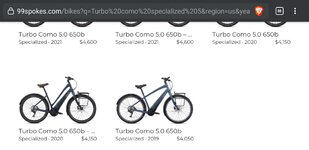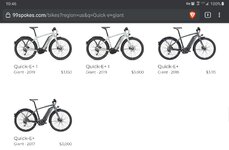Asher
Well-Known Member
This question is more in the spirit of understanding changes in e-bike retailing, especially from probably the most dominant bike maker, but... why did Giant massively hike its price for nearly the same bike, the Quick-E+ 2019 vs Fastroad E+ EX Pro 2021.
You might say that the 2021 has the corona crunch pricing premium. Indeed, the 2020 model was $3,500, $400 less, but it also had a smaller 375wh battery vs the 500 on both 2019 and 2021. So I see most of the effective price hike occurring between the 2019 and 2020 models, when the price spiked $500 and the battery shrank (at a time when other brand are going from 400 to 500 to 600+ wh batteries stock). The newer models do look better, with a down tube that's straight, instead of twisting along the way, but that's the only thing that really stands out. The cheaper model actually had pricier Schwalbe tires (vs Kendas) and a front derailleur, and the website 99Spokes rates the older model as having slightly better overall specs. The newer model has also seen several reports of motor failure from riding in wet or bumpy conditions.[1]
Looking back, a $3k Yamaha speed pedelec/Class 3 e-bike, with a lifetime frame warranty AND 2 year part warranty serviced by your local bike shop is very competitive, including with direct sales brands like Juiced, Priority, et al, when you consider the full package. Now, it's $3900, when the comparable Trek is only $400 more, and comes with the bigger 625 wh battery. Giant usually offers better value than Trek/Specialized, but that seems to have evaporated after 2019 for their flagship urban e-bike. I'm drawn to the Fastroad for its more athletic geometry vs its peer models from Trek, Specialized, Cannondale, it's just odd how Giant has ratcheted their pricing here. Based on 2019 pricing, we could've seen a 2022 630wh model for say, $3250, now it would be ~$4200, or just stay at 500wh $3900.
Maybe the e-bikes have higher servicing costs than they expected, and they waited until a model change to hike prices. But the Quick-E started in model year 2017, so it wasn't new.
The most plausible explanation is Giant either couldn't or wouldn't produce enough e-bikes to meet demand, and they went for a more low volume, high price business strategy. Giant has a special vantage point over the industry, since it makes frames for other major brands as well as itself. It's not hard to imagine that Giant quietly dropped any ambitions to compete on value with other brands, to keep bike shop prices high and profitable. Meanwhile, Giant has a cheaper sub-brand Momentum, but the components spec'ed are lower grade. Given that Giant now has Momentum to occupy the $2500-$3000 price tier, the odds of the FastRoad coming back down below $3500 are pretty close to zero.
I think what we're seeing here is Giant's transition from a high quality high value brand to yet another big name, big price brand, like Trek, Specialized, Cannondale. Giant's executive's comments seems to indirectly affirm this profit margin over volume strategy, "Despite the rush of first-time bike buyers, she does not plan to “blindly” invest in new manufacturing capacity. She is not yet convinced the world’s newfound love for two-wheelers will outlast the pandemic." [2] Their new sub-brand lets them hit the same price points as before, with lower quality goods. This also flies in the face of people claiming e-bikes are like smartphones and laptops that will see consistent price cuts over time. Poking around on the bike database 99Spokes seems to confirm this, that the days of Giant being a value brand are basically over, with Giant's bikes costing very similar amounts to similarly specced Treks et al.
I personally don't care for Rad Power bikes, but their rise seems like the best counterweight against this new normal of selling a $3k bike for $4k. If bike brands are bleeding customers to Rad, maybe they can win them back by bringing prices down, post-pandemic. But I don't see that happening until 2023 onwards. Canyon is also the value brand that Giant once was, but it doesn't have local stores, and it doesn't sell speed pedelecs.
Momentum's flagship urban e-bike is the Transend E+ at $2600: https://www.momentum-biking.com/us/transend-eplus
You can view a comparison here: https://99spokes.com/compare?bikes=...giant-fastroad-eplus-ex-pro-2021;*z.XL|w.650b
CC @Ravi Kempaiah
Court's review of the Quick:
Comparison summary:


[1] Motor failures on 2020 model.

 www.emtbforums.com
www.emtbforums.com
 www.pedelecs.co.uk
[2] https://www.nytimes.com/2020/08/17/business/giant-bikes-coronavirus-shortage.html
www.pedelecs.co.uk
[2] https://www.nytimes.com/2020/08/17/business/giant-bikes-coronavirus-shortage.html
You might say that the 2021 has the corona crunch pricing premium. Indeed, the 2020 model was $3,500, $400 less, but it also had a smaller 375wh battery vs the 500 on both 2019 and 2021. So I see most of the effective price hike occurring between the 2019 and 2020 models, when the price spiked $500 and the battery shrank (at a time when other brand are going from 400 to 500 to 600+ wh batteries stock). The newer models do look better, with a down tube that's straight, instead of twisting along the way, but that's the only thing that really stands out. The cheaper model actually had pricier Schwalbe tires (vs Kendas) and a front derailleur, and the website 99Spokes rates the older model as having slightly better overall specs. The newer model has also seen several reports of motor failure from riding in wet or bumpy conditions.[1]
Looking back, a $3k Yamaha speed pedelec/Class 3 e-bike, with a lifetime frame warranty AND 2 year part warranty serviced by your local bike shop is very competitive, including with direct sales brands like Juiced, Priority, et al, when you consider the full package. Now, it's $3900, when the comparable Trek is only $400 more, and comes with the bigger 625 wh battery. Giant usually offers better value than Trek/Specialized, but that seems to have evaporated after 2019 for their flagship urban e-bike. I'm drawn to the Fastroad for its more athletic geometry vs its peer models from Trek, Specialized, Cannondale, it's just odd how Giant has ratcheted their pricing here. Based on 2019 pricing, we could've seen a 2022 630wh model for say, $3250, now it would be ~$4200, or just stay at 500wh $3900.
Maybe the e-bikes have higher servicing costs than they expected, and they waited until a model change to hike prices. But the Quick-E started in model year 2017, so it wasn't new.
The most plausible explanation is Giant either couldn't or wouldn't produce enough e-bikes to meet demand, and they went for a more low volume, high price business strategy. Giant has a special vantage point over the industry, since it makes frames for other major brands as well as itself. It's not hard to imagine that Giant quietly dropped any ambitions to compete on value with other brands, to keep bike shop prices high and profitable. Meanwhile, Giant has a cheaper sub-brand Momentum, but the components spec'ed are lower grade. Given that Giant now has Momentum to occupy the $2500-$3000 price tier, the odds of the FastRoad coming back down below $3500 are pretty close to zero.
I think what we're seeing here is Giant's transition from a high quality high value brand to yet another big name, big price brand, like Trek, Specialized, Cannondale. Giant's executive's comments seems to indirectly affirm this profit margin over volume strategy, "Despite the rush of first-time bike buyers, she does not plan to “blindly” invest in new manufacturing capacity. She is not yet convinced the world’s newfound love for two-wheelers will outlast the pandemic." [2] Their new sub-brand lets them hit the same price points as before, with lower quality goods. This also flies in the face of people claiming e-bikes are like smartphones and laptops that will see consistent price cuts over time. Poking around on the bike database 99Spokes seems to confirm this, that the days of Giant being a value brand are basically over, with Giant's bikes costing very similar amounts to similarly specced Treks et al.
I personally don't care for Rad Power bikes, but their rise seems like the best counterweight against this new normal of selling a $3k bike for $4k. If bike brands are bleeding customers to Rad, maybe they can win them back by bringing prices down, post-pandemic. But I don't see that happening until 2023 onwards. Canyon is also the value brand that Giant once was, but it doesn't have local stores, and it doesn't sell speed pedelecs.
Momentum's flagship urban e-bike is the Transend E+ at $2600: https://www.momentum-biking.com/us/transend-eplus
You can view a comparison here: https://99spokes.com/compare?bikes=...giant-fastroad-eplus-ex-pro-2021;*z.XL|w.650b
CC @Ravi Kempaiah
Court's review of the Quick:
Comparison summary:
[1] Motor failures on 2020 model.

Giant Fastroad Ex Pro - Randomly switches off
Hi all, I have a Giant Fastroad Ex Pro, it's around 1 month old. https://www.giant-bicycles.com/gb/fastroad-eplus-ex-pro-electric-bike It has started randomly cutting out. Most of the time when riding but occasionally I set off from the lights and look down to see the bike is off. The firm I...
Giant FastRoad E+2 Pro Battery Issues
Hi Guys, I am new to the forum, looking for some guidance. I bought a Giant Fast road E+ 2 Pro 2020 model in January for my 20KM office commute. After a week, the battery assist just randomly switched off multiple times and I had to switch it on during the ride every time. Giant Twickenham then...
Last edited:




